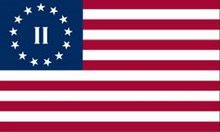Lie number 1, Part a, What the First Amendment says and does not say.
Believers that the constitution provides for a separation of church and state claim the first amendment supports this theory. Does it? The first amendment, a part of the ten amendment Bill of Rights to the U.S. Constitution states, Congress shall make no law respecting an establishment of religion, or prohibiting the free exercise thereof; or abridging the freedom of speech, or of the press; or the right of the people peaceably to assemble, and to petition the Government for a redress of grievances.
What does this amendment really say? First, Congress can not mandate a state religion or church, such as in England, which recognized the Church of England, i.e., The Anglican Church, as official church of the realm. The original passengers of the Mayflower that landed on the shores of Virginia in 1620, came so that they could worship as they pleased, and not be subject to a state church, nor be required to support it in taxes, only to find that the law of the land from 1624 mandated that white Virginians worship in the Anglican church of England) and support its upkeep with their taxes. Source.
The following paragraphs were taken from a web site owned by the Anti-Defamation League under an article titled: Separation of Church and State: A First Amendment Primer (Click here for article).
Public school teachers rightly function as important authority figures in the lives of their students. But, under the Constitution, their authority may not extend to matters of religious belief. According to the Supreme Court, the First Amendment requires that public school students never be given the impression that their school officially sanctions religion in general or prefers a specific faith in particular. Further, students must never feel coerced by peer or public pressure into adhering to the dictates of any religion.
Contrary to the claims of opponents of church-state separation, public school students enjoy very broad rights to act in accordance with their religious values and to practice their religious beliefs while at school. From words of grace whispered quietly before a meal in a cafeteria to prayer groups gathering before school at the flagpole, every day all over the country, students engage in constitutionally protected religious expression on public school grounds. Source.
With respect to the first paragraph, the U.S. Constitution nowhere prohibits teachers or other school officials authority over matters of religious beliefs. Authority includes the power to guarantee students not to be forced by other students or by the authority itself. Matters of religious belief is a broad topic. The second paragraph states, public school students enjoy very broad rights to act in accordance with their religious values and to practice their religious beliefs while at school. Within the past few years, this is no longer true. Students are limited in their free speech concerning their feeling and beliefs in racial, religious, political, and social matters, by what is now termed, as “political correctness.” Students have been expelled for wearing clothing which school officials ‘claim’ offend other students, while allowing Hispanic and other minority students those privileges. Some students at some schools have been stripped or their individual rights to worship contrary to the phrase or prohibiting the free exercise thereof; or abridging the freedom of speech. As previously stated, this has been accomplished under the false authority of “political correctness.
Part b, to follow shortly.

